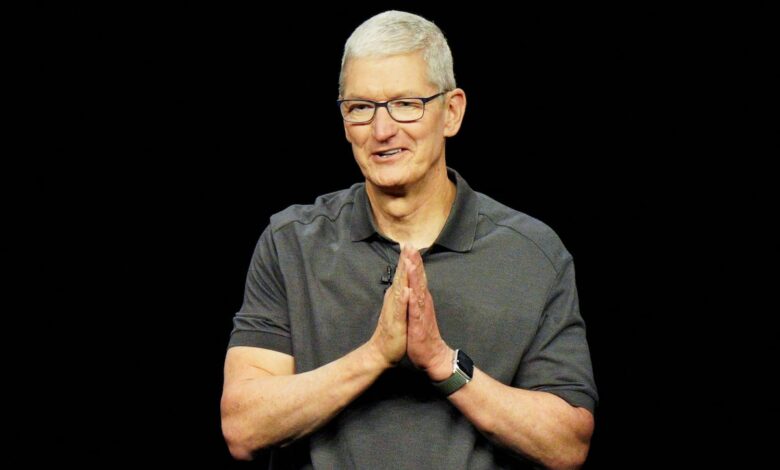Apple enters the generative AI race | Technology

Following this week’s announcements about new generative artificial intelligence projects at OpenAI and Google, all eyes in the industry have turned to Apple. Tim Cook, the U.S. company’s CEO, just announced that the firm will soon go public with its next steps in the new field of open AI, which recently exploded with the introduction of ChatGPT. That will take place on June 10, at the opening of the annual Worldwide Developers Conference, when the new features of iOS 18, the latest iPhone operating system, will be announced. Amid a general lack of details, multiple rumors have taken flight over the last few weeks regarding potential directions in which the technological giant could move.
Analysts seem to be in agreement that Apple’s entry into the generative AI race will not be geared towards directly competing with OpenAI and Google, but rather, that the iPhone manufacturer could break the current tie between the two by choosing one of them to work with its chatbots and other AI services. According to the latest leaks, Apple may be on the verge of signing a deal with ChatGPT to integrate it into the iPhone: although the same sources note that talks with Google are still in progress over using its Gemini technology. For both competitors, having such privileged access to a billion-plus iPhone users would be a key goal in their fierce rivalry.
Since the launch of the first iPhone in 2007, Google has paid Apple a considerable sum — $20 billion in 2022 alone — to have its search engine as the default on the phones. Although it is still unknown whether Apple will opt for OpenAI or Google, and to what extent it will integrate AI features, leading analysts of the company’s policy believe the it will lean towards a different kind of contract than that of the search engine.
Namely, instead of setting the ChatGPT or Gemini chatbots as default on the iPhone, the deal might entail utilizing their technology. According to Bloomberg’s Mark Gurman: “The two companies are in active negotiations to let Apple license Gemini, Google’s set of generative AI models, to power some new features coming to the iPhone software this year.” In his daily newsletter Stratechery, Ben Thompson writes that he thinks that Google has a better-suited infrastructure compared to that of OpenAI when it comes to being able to manage the avalanche of traffic and data processing that iOS integration would necessitate. Meanwhile, John Gruber, in his technology-focused blog Daring Fireball, holds that: “I could also see Apple negotiating deals to use multiple AI providers behind the scenes, treating them like white-label providers, while presenting the features to users under the Siri brand.”
Many of the expectations regarding Apple’s next moves focus on what could be a dramatic revamp of its Siri voice assistant to make it truly intelligent. Since Siri’s debut in 2011, one day before Steve Jobs’ death, it has seen few important updates and though it can resolve simple tasks like calling a contact from one’s phonebook, its voice recognition system is still resistant to other asks, like playing a certain song or album. Google’s assistant and Amazon’s Alexa outpaced Siri years ago, and are considered more efficient and intelligent.
The fall of Siri
The 2022 arrival of ChatGPT, with its vastly superior capacity to listen, give responses and even chat with users, made Apple’s fall behind the competition when it came to voice-activated assistants all the more evident. And this week’s OpenAI demonstration of its new voice conversation mode — reminiscent of the movie Her in that it is capable of such things as telling a story about any subject you request, giving it the user’s favorite kind of dramatic twist, and performing it in multiple languages — has sent Siri directly to the box of forgotten toys.
If Apple opts to run with ChatGPT or Gemini when it comes to speaking directly to iPhone users and answering their requests, that would be the end of Siri. And Apple would lose considerable control over privacy, which has become one of its big talking points in recent years. Faced with the general sentiment that Apple is being left behind in the field of artificial intelligence, Cook declared during a recent quarterly presentation: “We believe we have advantages that will differentiate us in this new era, including Apple’s unique combination of seamless hardware, software and services integration, groundbreaking Apple silicon with our industry leading neural engines, and our unwavering focus on privacy, which underpins everything we create.”
According to John Gruber, who has a long history of accurately predicting Apple’s new announcements, “Apple’s own efforts in language models [which are driven by generative AI] seem to be directed towards processing in its own device,” taking advantage of the abilities of its own processors and maintaining all control over privacy, as compared to services like ChatGPT, which utilize the enormous processing capabilities of cloud server farms. Apple might opt to create relatively simple AI mechanisms for iPhones with the iOS 18 software, which will debut in September. They would manage sensitive information, like summing up an audio message or writing a response to an email, in line with what Samsung has already incorporated into its latest cell phones.
Apple’s privacy and its own chips
Compared with its competition, Apple has a distinct advantage in that it manufactures its own processors for its telephones, tablets and computers. Last year it surprised the tech industry with how quickly it evolved: in just six months, the firm went from launching the M3 processor for its MacBook Pro to debuting the new M4 generation for the new iPad Pro, which just went on sale. Since 2017, Apple has been including a neural core in its processors that is exclusively dedicated to performing artificial intelligence tasks on its devices; the most recent leaks point to the technological giant preparing these chips to be used by its own cloud servers.
“We continue to feel very bullish about our opportunity in generative AI. We are making significant investments and we’re looking forward to sharing some very exciting things with our customers soon,” added Cook in his recent speech for analysts and investors. Until the June 10 presentation, with which Apple will kick off its annual meeting with the app developers for its devices, the company will not go public with its plans. And, besides leaks, it will not be possible to deduce many concrete details from the AI business acquisitions that the company has made over the last year, or from the scientific articles on language models that it has posted. Neither have been considered very relevant by experts.
The only thing that Apple has let slip, though this is far from a big reveal, is that it wants to make a big entrance in the hot new field. “We are putting a tremendous amount of time and effort into artificial intelligence,” Cook told his investors in February. Since then, his marketing team has taken pains to emphasize the capabilities of its devices in that area, coming up with hard-to-substantiate claims like “customers love the incredible AI performance of the latest MacBook Air and MacBook Pro models.”
As we wait for the real details on how Apple will make its promised entry into the generative AI race, the company does appear to have the resources it needs for a significant launch in the field, following the cancellation of its multi-billion-dollar project to create a self-driving car, and its recent completion of its first mixed reality glasses, the Vision Pro. AI is a marathon, not a sprint, and we’re still in its beginning phases with the new ChatGPT voice assistant and the recently presented update of the Google AI search engine — but those projects indicate just what is at stake when it comes to creating a new way of interacting with our computers, cell phones, and tablets.
Sign up for our weekly newsletter to get more English-language news coverage from EL PAÍS USA Edition



